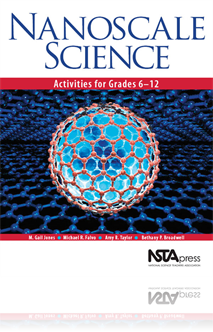All Book Chapters
Book Chapter
The purpose of this assessment probe is to elicit students’ ideas about seeds. It specifically probes to find out if students recognize that a seed has needs, similar to other organisms that allow it to develop into the next stage of its life cycle...
Book Chapter
The purpose of this assessment probe is to elicit students’ ideas about plant growth. It specifically probes to find out if students think plants only grow if they are exposed to light....
Book Chapter
The purpose of this assessment probe is to elicit students’ ideas about food and plants. The probe is designed to reveal whether students use a biological concept of food to identify what plants use for food....
Book Chapter
The purpose of this assessment probe is to elicit students’ ideas about transformation of matter. The probe is designed to reveal whether students recognize that a gas from the air (carbon dioxide) is combined with water and transformed into the ne...
Book Chapter
The purpose of this assessment probe is to elicit students’ ideas about cell size. The probe is designed to find out if students think that animal cell size is related to the overall size of an animal. ...
Book Chapter
The purpose of this assessment probe is to elicit students’ ideas about when objects can be seen in the sky. Students’ explanations reveal their thinking about the role of light and distance in seeing sky objects. ...
Book Chapter
The purpose of this assessment probe is to elicit students’ ideas about density and buoyancy. The probe is designed to find out how students think an object can be made to float differently. ...
Book Chapter
The purpose of this assessment probe is to elicit students’ ideas about density. The task is designed to find out if students think a solid object will float differently if it has holes poked all the way through it or if they confuse it with mixed ...
Book Chapter
The purpose of this assessment probe is to elicit students’ ideas about boiling point. The probe is designed to find out whether students recognize that if a liquid is boiling under standard conditions, the boiling point remains constant, no matter...
Book Chapter
The purpose of this assessment probe is to elicit students’ ideas about particles during a change in state. The probe is designed to find out if students recognize that the bubbles formed when water boils are the result of liquid water changing int...
Book Chapter
The purpose of this assessment probe is to elicit students’ ideas about chemical bonds. The probe is designed to find out if students think bonds are physical matter or attractions between electrons. ...
Book Chapter
Fact or Fiction: Exploring the Myths and Realities of Nanotechnology
Will clouds of self-replicating nanobots take over the world, or is this just a scene from a science fiction novel? Nanotechnology is a rapidly growing field that has huge potential for transforming our world. But the reality of advances in nanoscale...
Book Chapter
Biomimicry: The Mystery of the Lotus Effect
One of the most interesting applications of nanoscale science involves nanomimicry—or technology that mimics the unique structures of biomaterials. This activity uses the forensics approach to have students investigate various plant surfaces and th...
Book Chapter
How Nature Builds Itself: Self-Assembly
By designing and building models with Legos and placing them in a reaction chamber, students will simulate the process of molecular self-assembly. This activity provides a basis for understanding that thermal energy at the nanometer scale is a determ...
Book Chapter
At the nanoscale, a completely different set of forces and interactions are experienced by molecules and atoms than we experience at the human scale. How do properties change with scale? Why is gravity so important to our daily lives but relatively u...



